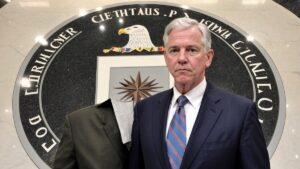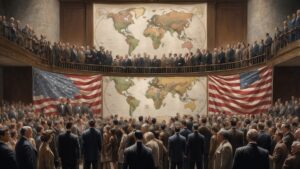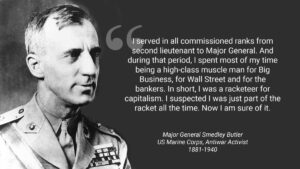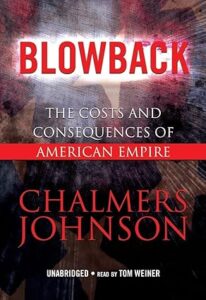In an age when American foreign policy seems locked in a perpetual cycle of war, intervention, and global overreach, a handful of courageous voices have risen to challenge the myth of “American exceptionalism.”
Far from being a noble form of patriotism, this ideology—critics argue—has become a cover for unchecked imperial ambition.
From the sobering analyses of retired Colonel Andrew J. Bacevich to the blunt and unapologetic warnings of former CIA official Michael Scheuer, these writers expose the dangerous consequences of America’s entanglement in endless foreign wars, all too often justified by loyalty to allies and ideologies that do not serve the nation’s true interests.
Their work calls for a return to a grounded, nationalist approach—one that prioritizes America’s sovereignty, border security, and constitutional integrity over the globalist dreams of the political elite.
Col. Andrew Bacevich Exposes the Dangers of American Imperialism
In today’s climate of constant military intervention and global entanglements, the idea of “American exceptionalism” is often treated as sacred.
But according to some of the most thoughtful critics of U.S. foreign policy, this belief is not a form of healthy nationalism—it’s imperialism in disguise. One of the leading voices challenging this dangerous myth is Colonel Andrew J. Bacevich, a retired U.S. Army officer, West Point graduate, and former professor of international relations at Boston University.
Bacevich is uniquely positioned to critique America’s foreign policy machine.
A decorated military man and outspoken critic of the neoconservative agenda, he brings a personal dimension to his warnings: his own son, also an Army officer, was tragically killed in the Iraq War—one of the very conflicts Bacevich publicly condemned.
Through his powerful books, Bacevich dismantles the illusion that America’s endless wars are noble or necessary. These titles are essential reading for anyone seeking to understand how U.S. foreign policy went so far off track:
-
The Limits of Power: The End of American Exceptionalism (2008)
-
The New American Militarism: How Americans Are Seduced by War (2005)
-
American Empire: The Realities and Consequences of U.S. Diplomacy (2004)
Each book is a hard-hitting critique of America’s global military posture.
As Bacevich explains, the push for U.S. dominance abroad has come at the cost of constitutional principles, national security, and countless lives.
His work challenges readers to reject the fantasy of a benevolent empire and to rethink what true patriotism means in an age of permanent war.
Chalmers Johnson and the Price of Empire
Another towering figure in the critique of American imperialism is the late Chalmers Johnson—a former CIA consultant and professor of international relations at the University of California, San Diego.
Johnson spent much of his later life warning Americans about the long-term consequences of their government’s foreign entanglements.
His work pulls no punches, shining a light on the hidden costs of empire and the blowback that inevitably follows covert operations and military adventurism.
Johnson’s four-book series on the “American Empire” is essential reading for anyone who wants to understand how the U.S. drifted from a constitutional republic into a militarized global power. His most important works include:
-
Blowback: The Costs and Consequences of the American Empire (2000)
Johnson introduces the concept of blowback—unintended consequences of covert U.S. actions abroad. He explains that the 9/11 attacks were not an attack on American freedoms, but a retaliation for decades of secret interventions. Because these operations were hidden from the public, Americans were left confused and eager to retaliate—thus creating the conditions for further cycles of violence.
-
The Sorrows of Empire: Militarism, Secrecy, and the End of the Republic (2004)
This book exposes the global sprawl of American military bases and the rise of a permanent war economy. Johnson argues that this militarism threatens not just other nations—but the very soul of the American republic. -
Nemesis: The Last Days of the American Republic (2007)
Johnson paints a sobering picture of an empire in decline, warning that America’s continued global meddling and erosion of civil liberties may lead to the irreversible collapse of democratic governance. -
Dismantling the Empire: America’s Last Best Hope (2010)
His final book offers a roadmap for pulling back from the brink. Johnson urges Americans to dismantle the empire before it drags the nation into complete ruin, both economically and morally.
Chalmers Johnson’s work offers a clear, well-documented warning: America’s imperial path is unsustainable.
If the nation hopes to preserve its republic and avoid further catastrophe, the cycle of war, secrecy, and foreign entanglement must be broken—sooner rather than later.
Michael Scheuer’s Nationalist Rebellion Against U.S. Foreign Policy
One of the most powerful and unapologetically nationalist critiques of modern American foreign policy comes from an unexpected source: a former senior CIA official.
In his 2008 book, Marching Toward Hell: America and Islam After Iraq, Michael Scheuer delivers a scathing indictment of the U.S. government’s disastrous interventions in the Muslim world.
Far from being a fringe opinion, Scheuer’s perspective represents a hard-edged realism rooted in firsthand experience—and his book is essential reading for anyone seeking to understand how far American foreign policy has drifted from its core national interests.
Before diving into the substance of Scheuer’s work, it’s important to address the skepticism that surrounds him.
From 1996 to 1999, Scheuer led the CIA’s unit focused on Osama bin Laden. After 9/11, he was brought back as a special advisor to the new leadership of the bin Laden task force.
For this reason, some in the 9/11 truth movement have dismissed him outright, viewing his career as a mark of suspicion. They argue that anyone tied to the official narrative is compromised or part of a cover-up.
But such knee-jerk rejection overlooks the deeper value of Scheuer’s work.
Whether one agrees with his acceptance of the official 9/11 story or not, Marching Toward Hell remains a courageous and brutally honest assessment of how misguided loyalty to foreign interests—particularly Israel’s—has hijacked American foreign policy.
Scheuer doesn’t pull punches. His warnings stem not from conspiracy theories, but from direct knowledge of the policies, agendas, and illusions driving the endless war machine in Washington.

Separating the Message from the Messenger
Critics within the 9/11 truth movement often dismiss Michael Scheuer out of hand, claiming he lacks credibility solely because of his former role as head of the CIA’s bin Laden desk.
To them, the fact that Scheuer publicly accepts the official narrative—that Osama bin Laden orchestrated the 9/11 attacks—disqualifies anything he has to say.
Many go further, insisting that bin Laden was a longtime CIA asset and that the attacks were an inside job orchestrated by the Bush administration, the CIA, the Illuminati, or the Council on Foreign Relations—depending on which version of the theory you hear.
But this reflexive skepticism, while understandable in a world full of government deception, too often becomes an intellectual trap.
To assume that all former CIA officers are automatically disinformation agents is a simplistic worldview—one that ignores nuance and refuses to engage with valuable insights from those who’ve seen the machinery of empire from the inside.
While some conspiracy theorists may never be shaken from their broad generalizations, it doesn’t change the fact that Scheuer’s critiques of U.S. foreign policy are among the most brutally honest and well-informed in print today.

A Rare Voice of Reason in a Sea of Deception
Let it be said plainly—for those eager to pounce on any positive mention of Michael Scheuer—that acknowledging the value of his work is not some veiled attempt to “cover up the truth.”
Yes, there will always be critics who claim that praising Scheuer somehow implicates the writer in a conspiracy to protect hidden powers.
But such accusations are hollow.
The truth is this: Scheuer’s Marching Toward Hell is one of the most sober, candid, and uncompromising critiques of U.S. foreign policy to emerge in the last three decades.
Whether or not one agrees with every detail of his background or beliefs, his analysis of America’s imperial misadventures is rooted in experience, clarity, and an unwavering commitment to putting America’s national interests first.
That makes his work not just relevant—but essential.
Scheuer’s Unflinching Critique of the U.S.-Israel Relationship
While my own long standing position is that the events of 9/11 were orchestrated by Israeli intelligence—a perspective I’ve maintained since the day it happened—the broader significance of Michael Scheuer’s Marching Toward Hell lies in its clear-eyed critique of the consequences of U.S. foreign policy, regardless of who pulled the trigger on that fateful day.
Even though Scheuer accepts the mainstream view that Muslim militants carried out the attacks, he does not shy away from stating the root cause of Muslim anger toward the United States: the overwhelming influence of the Israel lobby in shaping American foreign policy.

Scheuer explains that U.S. actions abroad, especially in the Middle East, are seen by much of the Muslim world as not only pro-Israel, but subservient to Israeli interests, often at the direct expense of America’s own.
He writes:
“Bin Laden and other Islamists believe that because of the American public’s unwarranted emotional guilt over the Holocaust, the wealth and resultant political influence of pro-Israeli figures and organizations in U.S. domestic politics, and Israel’s superb covert action inside the United States—which has created a situation where Americans damn other Americans for questioning the U.S.-Israeli relationship and try to limit their willingness to speak out by slinging the anti-Semitic slur—U.S. foreign policy is all but welded to support Israel without limit.”
Scheuer has paid a steep price for saying these things out loud.
He has been labeled an “America-hater” and smeared as a “rank anti-Semite.”
Yet he stands his ground. In response to such attacks, he makes it crystal clear:
“[Their words] clearly say that their fellow Americans cannot be patriots if they use their right to free speech to question any aspect of the U.S.-Israeli relationship… Any American who claims that the impact of unqualified U.S. support for Israel in the Muslim world is unreservedly damaging to U.S. interests is… a Mein Kampf-reading Nazi.
I have never accepted and will forever reject the idea that to intensely dislike the nature of the relationship the U.S. government has fabricated with Israel, and to believe that that relationship is not only a burden but a cancer on America’s ability to protect its genuine national interests—which I do believe—equates to either anti-Semitism or a lack of American patriotism.”
In truth, those who weaponize accusations of anti-Semitism to shut down legitimate criticism of U.S.-Israeli relations are not defending America—they are suppressing necessary debate.
Scheuer’s book, regardless of one’s position on 9/11, breaks that silence with rare clarity and courage.
Nationalism Without Apology: Scheuer’s America-First Doctrine
In my view, those who are quickest to hurl accusations of “anti-Semitism” whenever the U.S.-Israel relationship is questioned often fall into one of two categories:
- either they are the most suspect when it comes to true American loyalty,
- or they are simply propagandists—liars committed to promoting the dangerous illusion that Israeli and American interests are one and the same.
Michael Scheuer, however, doesn’t play their game.
He makes no apology for his America-first worldview, laying out a nationalist position with unapologetic clarity.
In a statement that would rattle the sensibilities of globalists and Zionists alike, Scheuer writes:
“Let me be clear: the only country I care about is the United States. I care not a whit whether or not Israel survives.
I likewise do not care if Zambia, Saudi Arabia, Bolivia, Papua New Guinea, Spain, or most any other nation survives.
Foreign nations are important only insofar as they can benefit America, and our relations with them should be predicated on that consideration and not on emotion, irrational guilt, Pollyannaish ideas about democracy, or the political influence brought by corrupt and corrupting lobbies, be they supporting Israel, Saudi Arabia, Armenia, Greece, or Lebanon.
America should associate with those nation-states that benefit America, steer clear of those that do not, and run as fast and far as possible from those that seek to involve us in fights in which we have no stake, particularly fights between religions.”
Scheuer’s message is clear: the business of America is America, not playing referee in centuries-old religious wars, nor bending its foreign policy to suit the agendas of foreign lobbies.
His nationalism is rooted in realism, not utopian ideals or emotional blackmail. It is a stance more needed now than ever before.

Scheuer’s Select Exceptions and a Message to the Israel-First Crowd
While Michael Scheuer unapologetically champions an America-first foreign policy, he does make room for a few key exceptions—namely, Great Britain, Canada, Australia, and New Zealand.
According to Scheuer, these nations earned America’s enduring respect through their shared sacrifices and bloodshed in the fight against tyranny during the 20th century.
As he puts it, “we owe a debt of honor” to these close allies.
(As a side note, I personally take issue with Scheuer’s enthusiasm for Britain, given its long history of imperial manipulation. Still, that’s a debate for another time.)
To his critics—especially those who place Israel’s interests above America’s—Scheuer offers a fiery rejoinder, quoting none other than Franklin D. Roosevelt in defiance of his enemies:
“In sum, let me bluntly say to the Israel-firsters, in the words of Franklin Roosevelt, used to defy the New Deal opponents he called Economic Royalists: ‘They are unanimous in their hatred for me, and I welcome their hatred.’”
With this statement, Scheuer makes it abundantly clear: he does not seek approval from those who confuse loyalty to a foreign state with patriotism.
His allegiance is—to borrow a phrase—unmistakably to the republic for which we stand.

Echoes of Washington: Scheuer on U.S. Devotion to Israel
In a powerful reflection on George Washington’s Farewell Address, Michael Scheuer draws a direct line between the first president’s warnings and modern American foreign policy—particularly our relationship with Israel.
Washington cautioned against forming a “passionate attachment” to any “favorite nation,” warning that such entanglements could lead to dangerous “concessions” and the “infusing into America” of that nation’s conflicts and hatreds.
Scheuer challenges Americans to consider whether those warnings now apply to the U.S.-Israel relationship:
“Is there a better description of the danger America faces because of its governing elites’ ‘passionate attachment’ to Israel? Is not our adversarial relationship with the Palestinians and Muslims generally an example of the ‘infusing into America’ of the ‘enmities’ of Israel?”
He goes further, calling out the blatant double standards:
“And what better definition of the double standard that our Islamist foes cite is there than the ‘concessions to the favorite Nation’—of privileges denied to others in the form of the constant U.S. veto of any U.N. resolution condemning Israeli actions?”
Scheuer’s point is clear: our lopsided devotion to a single foreign power has entangled America in costly conflicts, compromised our global standing, and betrayed the foundational wisdom of our own republic’s founding leader.

Scheuer on Israel’s “Right to Exist” and America’s Misguided Loyalty
Michael Scheuer makes a sharp distinction between criticism of Israel and criticism of U.S. foreign policy that sacrifices American interests for the sake of Israel.
He pulls no punches in asserting that American politicians, not Israel itself, are to blame for placing the U.S. in harm’s way:
“My criticism is not for Israel but for U.S. governments that have knowingly put America at risk on Israel’s behalf… Nothing in America’s relationship with Israel rises to the level of a U.S. national interest.”
Scheuer argues that much of the political class confuses emotional, financial, and political loyalty to Israel with actual national interest:
“It is dangerous and ultimately self-defeating to confuse the tremendous emotional attachment of some U.S. citizens and most of the American governing elite have for Israel—with campaign contributions of many of the former often cementing the support of many of the latter—with the actual existence of a genuine U.S. national security interest in the survival of Israel.”
He also challenges the widely parroted claim that Israel has a “right to exist”:
“No nation has the ‘right’ to exist; Darwinian logic applies to nation states just like the animal kingdom. If there was such a right, the world would be working to revive the Soviet Union, Sparta, Carthage, or the Latin Kingdom of Jerusalem.”
Scheuer sees this belief as both ahistorical and selectively applied, pointing out that the United States never required enemies like the Soviet Union to first recognize America’s “right to exist” before engaging diplomatically:
“Supporting Israel’s ‘right to exist’ is especially ahistorical when it is advocated by Americans, as it is a ‘right’ they have never insisted on for their own nation. If they had, we would never have talked or negotiated with the Soviets after Premier Nikita Khrushchev promised that the USSR would ‘bury’ the United States.”
In Scheuer’s view, the unconditional U.S. support of Israel—based on emotion, lobbying pressure, and a warped interpretation of national interests—is dragging America into endless conflict with the Muslim world, while undermining our own sovereignty and strategic well-being.

Scheuer Blames Elite Arrogance for America’s War Disasters
Michael Scheuer offers a blistering historical critique of America’s foreign policy failures in Iraq and Afghanistan, placing the blame not on the military rank-and-file or the American people—but squarely on the bipartisan foreign policy elite.
According to Scheuer, the architects of these wars operated under delusional assumptions rooted in Cold War thinking:
“Without exception, U.S. political leaders, Republican and Democratic, approached the wars with Cold War assumptions: America was the sole superpower, undefeatable, and was fighting on behalf of the civilized world… liberated populations would joyously welcome invasion, occupation, and the installation of secular democracy.”
These assumptions, he argues, were tragically misguided.
Not only did the elites underestimate the nature of the enemy, but they were also blind to the deep historical grievances held by Muslims around the world—grievances that Osama bin Laden masterfully used to rally support.
Scheuer recounts bin Laden’s six-point indictment of U.S. foreign policy, which few American leaders took seriously:
-
U.S. military presence on the Arabian Peninsula
-
Occupation of Muslim lands
-
Unqualified support for Israel
-
Support for Russia, China, and India against Muslim populations
-
Exploitation of Muslim oil
-
Protection of corrupt Muslim tyrannies
These weren’t the ravings of a lunatic, Scheuer warns—they were rallying cries understood by millions in the Muslim world, even if they were ignored or dismissed in Washington.
“Our bipartisan governing elite was wrong on every count. They were also ignorant of the malodorous foreign policy baggage they brought with them to the wars in the Muslim world…”
The result? What Scheuer calls “self-imposed tragedies of unplanned-for length and Shakespearean proportions.”
American leaders charged into war arrogantly, ignorantly, and without accountability, setting in motion a disaster that continues to undermine U.S. credibility and stability abroad.

Scheuer Debunks the Myth of Saddam–Bin Laden Collaboration
Michael Scheuer delivers a scathing rebuke to the warmongers who, in the lead-up to the Iraq War, promoted the false narrative that Osama bin Laden and Saddam Hussein were allies conspiring against the United States.
Despite overwhelming evidence to the contrary, this myth continues to persist in some circles. Scheuer exposes this deception for what it is: a calculated lie that served the interests of those pushing for war.
Scheuer writes:
“Intelligence officers who had been working against Sunni extremism since the late 1990s understood that the looming Iraq war was certain to destroy two of our most important and reliable de facto allies in that anti-Islamist struggle: Iraq and Syria.”
Far from collaborating with Islamist terrorists, Saddam Hussein’s Iraq and the Assad regime in Syria were, according to Scheuer, relentless enemies of Sunni jihadist groups.
They didn’t need U.S. money or weapons to do it, either. These regimes had their own motivations: survival.
“They were the best kind of allies, in that Washington did not have to arm, coerce, bribe or cajole them into acting in the most murderous manner against most Islamists.”
Both Saddam and the Assads considered Islamist militants a direct threat to their grip on power.
As such, they cracked down harshly—not only on foreign jihadists but especially on domestic Islamists.

Contrary to neocon propaganda, these regimes refused to allow terrorist training camps or safe havens on their soil, and they dealt decisively with any who tried.
“Saddam’s Iraq and al-Assad’s Syria were inherently helping the United States by standing as very effective bulwarks against any easy and secure westward movement of the Sunni Jihad’s main base in South Asia, toward the Levant, Israel and Europe.”
Scheuer’s point is clear: in toppling Saddam, the U.S. didn’t weaken terrorism—it opened the gates for it to flourish.
The war’s architects ignored the real dynamics of the region, dismantled two useful barriers against jihadism, and set off chaos that continues to destabilize the Middle East to this day.
Scheuer Warns: U.S. Occupations Breed Enemies, Not Democracy
Michael Scheuer does not hold back when criticizing those who failed to foresee the inevitable consequences of America’s interventions in the Middle East.
While many Americans—especially Republicans—clung to the idea that the U.S. was “bringing democracy” to Iraq and Afghanistan, Scheuer, an experienced intelligence insider, saw things far more clearly.
“Generally speaking, history shows that most nation-state populations, with the possible exception of the French, do not like to be invaded and occupied, even if the invaders hand out MREs to families, candy to children and fistfuls of greenbacks to all and sundry.”
He points out a truth that many war-hawks ignored: occupations rarely succeed.
Despite the propaganda, Iraq and Afghanistan were nothing like the quick operations in Panama or Grenada.
In fact, Scheuer suggests that the occupations served only to validate the worst fears of America’s enemies and embolden the very forces Washington claimed to be fighting.
“History’s list of unwelcome and ultimately vanquished occupiers is far lengthier than history’s list of successful occupations.”
The irony, Scheuer notes, is brutal: those Americans who despised Muslims the most were the ones whose blind loyalty to neoconservative war policy actually empowered Muslim fundamentalists.
“Not a lick of classified intelligence information was needed to know what repercussions the invasion of Iraq would cause. All that was needed was to read the words of our Islamist enemies, know a bit about Islam and its history, and ignore the advice of politically-motivated experts… and the rest of that pro-war media lobby that helped sink U.S. interests in the sands of Iraq. Once U.S. and Western forces set foot in Iraq, bin Laden’s predictions were validated.”
And when the disastrous results could no longer be denied, Scheuer warned Americans to beware of the blame-shifting games that would follow.
The foreign policy elite, who led the country into these wars, would soon be scrambling for cover.
Scheuer cautions that when the full failure of Iraq becomes “clear and unquestionable,” the very architects of the disaster will “point fingers anywhere but at themselves.”
His message is stark: American arrogance and ideological blindness created a catastrophe, and the people who pushed it will do anything to escape accountability.
False Solutions and Political Cowardice: Scheuer’s Warning to America
Michael Scheuer doesn’t mince words when it comes to the predictable response of the political class in the aftermath of failed wars.
He argues that much of the rhetorical smoke screen will come from the Democratic Party, which—rather than acknowledging the flawed foundation of U.S. policy—will simply propose another expensive and misguided solution.
Scheuer criticizes the idea of a “New Deal for the Middle East,” saying it will be promoted as a way to “de-radicalize” Muslims and transform them into peaceful, moderate democrats—essentially, to mold al-Qaeda and its affiliates into “a slightly more aggressive version of the Rotary Club.”
This kind of thinking, according to Scheuer, is not just naive—it’s delusional.
It fails to recognize the deeply rooted political, historical, and religious grievances that fuel anti-American sentiment in the Muslim world.
Throwing money at the region won’t erase the consequences of decades of meddling, war, and double standards.
Furthermore, Scheuer points out the stranglehold of special interests, particularly the pro-Israel lobby, on American politics.
He warns that any politician who dares to advocate for a real change in U.S. foreign policy—especially regarding Israel—does so at great personal and political risk:
“At the level of federal elections a candidate who demands major changes in these policies—or in the case of Israel, even minor ones—knowingly takes the risk of fatally handicapping his or her chances of victory.”
In short, the system is rigged to preserve the status quo, no matter how disastrous it may be. Scheuer’s analysis calls for a level of courage and honesty in foreign policy debates that is almost entirely absent in today’s political landscape.

Scheuer Exposes the Lie Behind “They Hate Us for Our Freedoms”
Michael Scheuer sharply criticizes the persistent myth that America was attacked on 9/11 because of its freedoms, not its foreign policy.
According to Scheuer, this false narrative has become a bipartisan talking point, used to shield the American public from the uncomfortable truth about how U.S. actions abroad are perceived.
“U.S. government officials and the leaders of both political parties simply and reflexively repeat that the Islamists hate America and are waging war against it because of our freedoms, liberty, and gender-equality—not because of what the U.S. government does in the Islamic world.”
Scheuer doesn’t hold back in calling this story what it is:
“This claim is a blatant lie, bad for that reason alone but worse because it keeps Americans from clearly gauging the enemy’s motivations and intentions, or bin Laden’s enormous potential appeal among the world’s 1.4 billion Muslims. Frankly, persisting in this lie amounts to a death wish.”
Even a decade after the attacks, Scheuer notes, only one figure in the American political class—Rep. Ron Paul—had publicly recognized the connection between U.S. foreign policy and Islamic hostility toward the U.S.
Scheuer believed Americans would actually find comfort in learning the truth: that Islamists were not waging a global holy war to destroy American culture or religion, but instead were reacting directly to U.S. policies in the Middle East.
He wrote that Americans should understand they face “a smart, thinking enemy, with limited war aims,” not the apocalyptic caricature offered by President George W. Bush, who insisted:
“They hate Christianity, they hate Judaism, they hate everything that’s not them.”
For Scheuer, telling the truth about foreign policy isn’t about siding with the enemy—it’s about clearly defining the enemy’s goals, and de-escalating an avoidable conflict that has already cost too much in lives and liberty.

Uncover how censorship shapes what you see, hear, and believe—read Unveiling Media Control: Censorship and the Battle for Truth to explore who decides what’s true.
Scheuer’s Urgent Call: Take Back Foreign Policy Before It’s Too Late
In Michael Scheuer’s view, America is running out of time.
The ruling class has failed, he warns, and it’s now up to ordinary citizens to reclaim control of the country’s destiny—starting with a complete overhaul of foreign policy.
“Americans must begin to do the thinking that their elites have proved themselves incapable of doing.”
Scheuer outlines a clear, urgent framework for national renewal:
-
Foreign policy must be re-centered on real national security interests, not ideology or the agendas of foreign lobbies.
-
Unnecessary interventions—political, diplomatic, and military—must end.
-
When force is truly necessary, it must be applied decisively and without hesitation, not filtered through politically correct restraints.
He also warns that homeland security, as it currently exists, is more of a slogan than a substance:
“Domestically, homeland security must become a reality, and not just a catch-phrase used to justify enormous, non-productive federal expenditures.”
Ultimately, Scheuer believes the survival of the republic depends not on politicians, but on the people themselves:
“A beginning must be made to return the American political system to the framework of responsible republican government crafted by the founders.
The people themselves must become the engines of their own and their country’s survival. And time is running short for them to do so.”
In an era of endless war and elite-driven agendas, Scheuer’s message is a sharp reminder that American sovereignty, liberty, and peace depend on public vigilance—not blind loyalty to failed leadership.

Scheuer’s Warning: The Growing Rift Between Elites and Everyday Americans
Michael Scheuer highlights a profound and dangerous divide in the United States — one that separates the ruling elites from the everyday working Americans when it comes to foreign policy and war.
He describes it as:
“The greatest and most dangerous divide in American society is between our governing elites—political, economic, military, and media—and the great bulk of work-a-day Americans on the issues of foreign policy and war.”
This statement serves as a clarion call for a renewed, traditional American nationalism that prioritizes the country’s own needs first. Scheuer observes that:
“Non-elite Americans are slowly coming to confront a reality in which those who govern them are eager to be ‘citizens of the world’ and are more concerned with affairs outside the United States than they are with fixing such daunting domestic problems as illegal immigration and funding for Social Security.”
In essence, Scheuer urges a shift back to focusing on American priorities — addressing the needs of its own people before entangling the nation in endless foreign conflicts or global agendas.
Discover how corporate-controlled media manipulates public opinion to justify endless wars in the Middle East—read Media Power and Influence: The Dynamics of Corporate Control.
The America Second Mindset Among Wealthy Elites
Scheuer points out an ironic and troubling trend among America’s wealthiest individuals, noting:
“Even leading private sector Americans do not seem immune from this aspiration.”
He highlights that, despite pressing domestic needs such as equity, healthcare, and infrastructure repair, many of the richest citizens prefer to funnel their fortunes abroad.
Scheuer names Bill Gates, Ted Turner, Warren Buffett, and others as examples of those who have adopted what he calls an “America second attitude,” engaging in high-profile international donations that also grant them significant tax benefits at home.

Scheuer adds a sharp critique of Bill Clinton’s global fundraising efforts:
“Bill Clinton, the ultimate European-wannabe ringmaster for this circus of aspiring world citizens, is strutting about the world seeking donations for humanitarian activities outside America.”
Even President Bush’s multi-billion-dollar initiative to combat HIV/AIDS in Africa is questioned by Scheuer, who finds it oddly prioritized given that places like the District of Columbia face HIV/AIDS rates worse than some sub-Saharan African countries.
This critique underscores Scheuer’s call for Americans—especially elites—to focus first and foremost on the urgent problems within their own country.
The Elite’s Dangerous Detachment from American Lives
Ultimately, Scheuer warns that the greatest danger in the divide between everyday Americans and their internationalist elites is the elite’s willingness to sacrifice American lives in foreign wars.
These conflicts, aimed at imposing freedom and democracy in the Islamic world, are driven by a disconnect from the people whose sons and daughters fight and die.
Scheuer bluntly states:
“These men and women have consciously made the decision that they will steadily spend the lives of our children to bring democracy, women’s rights, parliamentary government, human rights, and secularism to those who want no part of them and in the Westernized form that is offered.”
He emphasizes that, even if some foreign populations desired these changes, it is not the U.S. government’s responsibility—nor within its Constitutional authority—to use American lives and resources to fulfill the wishes of other nations.

The Folly of Toppling America’s Reluctant Allies
Scheuer highlights a harsh truth: while the foreign policy elite now champion the war against Islamic fundamentalists, their past efforts to remove Saddam Hussein and Bashir al-Assad were reckless mistakes.
These secular leaders were actually strong, ruthless, and reliable U.S. allies in the fight against Sunni Islamist militancy.
Scheuer describes them as “the cork in the bottle’s neck,” preventing Islamist fighters from easily moving westward from South Asia to the Levant, Turkey, Europe, and the Arabian Peninsula.
He explains:
“Neither regime needed convincing, arms, or funding from the United States to resist and persecute the Islamists; as is almost always the case, regimes that are scared to death for their survival, as were those of Saddam and al-Assad, make the best allies. Faced with the chance to use this cost-free bulwark, the Bush administration and Congress destroyed it in the name of trying to outdo Woodrow Wilson, a human scourge who is not often enough ranked with the 20th Century’s top bloodletters.”
In essence, Scheuer advocates for a clear America First, nationalist agenda focused on real homeland security—an approach that no other mainstream writer has articulated so powerfully or plainly.
Securing America’s Borders: A National Priority
Scheuer sharply criticizes the U.S. government’s failure to protect the nation’s physical borders, pointing out that while America’s best and most expensive military forces are spread thin overseas, fighting unwinnable “Wilsonian wars” to impose secular democracies on Muslim populations who fiercely resist them, the homeland remains vulnerable.
He condemns the decades-long neglect by elected officials who have “knowingly and deliberately” failed to secure U.S. borders. Scheuer lays out a clear prescription for action:
“Deploy the U.S. Army and Marines along U.S. land borders to prevent the entry of illegals and to ensure an effective network of fences, trenches, water towers, radars, and if necessary, minefields can be built in a crash program along the Canadian and Mexican borders.”
For Scheuer, securing the homeland must be America’s foremost responsibility.

States’ Rights and Defiance: A Bold Call for Domestic Security
Scheuer strongly advocates for states’ rights as a vital component of protecting American homeland security.
He insists that “State and local governments must effectively defy the federal government by working together,” declaring this the only real way to begin safeguarding the nation’s domestic security.
The former CIA official does not hold back:
“Defiance will require blatantly refusing to obey Washington’s edicts. But in either case, state governors must for now be the leading agents of this defiance.
If America is to be protected, the governors must work across party lines and focus solely on the security of their citizens and nation.
The governors should exert their control over the military reserve units that fall under state jurisdiction and refuse to transfer control of them to the federal government.
The governors should then mobilize and deploy these units to staff and administer state-mandated border control regimes to stop the flow of illegal immigration.”
Scheuer’s call is clear: governors must take the lead in defending America’s borders and citizens, even if it means openly resisting federal directives.

State Defiance Against Federal Overreach—A Rallying Call in Crisis
Scheuer warns that if federal authorities attempt legal or physical actions against defiant states, governors must stand firm and refuse to comply.
He argues that:
“Washington will quickly find that the electorate in time of war will rally to governors who act to protect them when the federal government will not.”
Scheuer highlights the limits of federal power in such a crisis, asking pointedly:
“Can any American imagine a U.S. soldier shooting a fellow citizen for defying the federal government in an effort to protect all citizens?”
His message is clear—state leadership will gain popular support, and federal attempts to enforce control could prove futile when citizens’ safety is on the line.
States’ Sovereignty as a Check on Unconstitutional War-Making
In conclusion, Scheuer emphasizes that states reclaiming their sovereignty can play a crucial role in ending undeclared and unconstitutional foreign wars.
He writes:
“The governors can also use their control over military reserves to begin to reign in the president’s unilateral and Un-Constitutional war-making abilities.
Nothing in our Constitution is clearer than the requirement for Congress to declare war.
By retaining state military units under their command, the governors will provoke a long-needed Constitutional confrontation between the electorate and the federal government that may at last return Constitutional sanity to the issue of making war.”
Notably, the final chapter of Scheuer’s compelling book is titled simply: “A Humble Suggestion—America First.”

A Call for Genuine Patriotism and Political Courage
Anyone who doubts Scheuer’s sincerity or misses the deep insights he offers is, quite simply, a fool.
True American patriots can only hope that, in the years ahead, more politicians will listen to Scheuer’s warnings and translate his advice into effective public policy.



